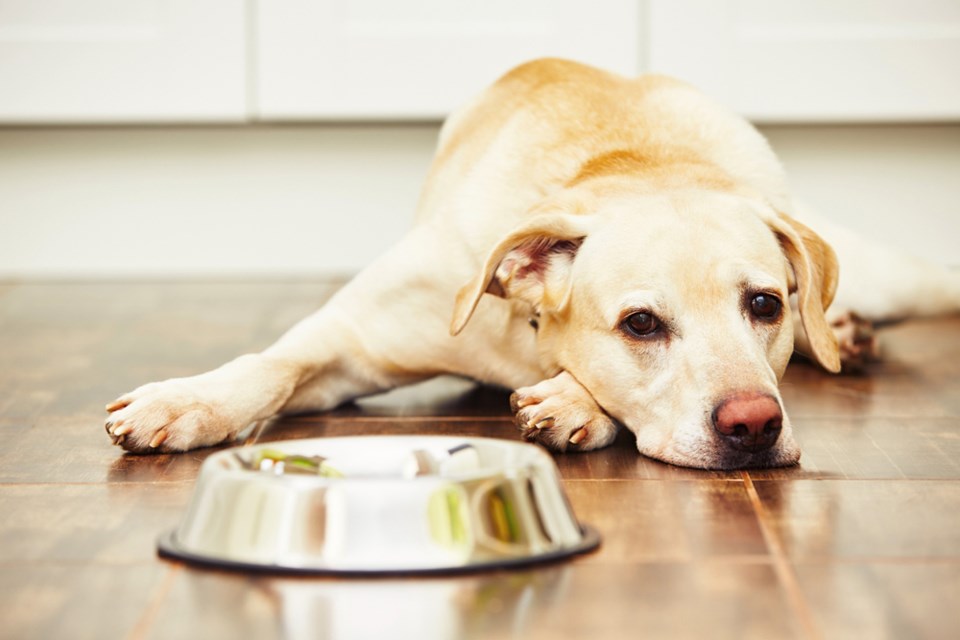Is your dog’s or cat’s relationship with its food trying to tell you something?
Pet owners wish only the healthiest, happiest life for their four-legged friend, of course. But not every owner knows how to detect warning signs that might suggest a risk to their pet’s well-being.
A Doctor of Veterinary Medicine (DVM) for more than 25 years, Dr. Leah Montgomery, owner of Riverwood Veterinary Clinic, wants to empower pet owners with the knowledge they need to ensure their beloved companion thrives for as long as possible.
And one of the best ways to do this, she says, is to always pay close attention to your pet’s appetite. If it appears to decrease or change in some unprecedented way, it may not simply be a newfound dietary pickiness, but an indication of a significant problem.
“If they go to their dish, look at it and walk away, or eat a few bites and walk away, or eat their treats just fine but aren’t as interested in their regular food – all of these could signal a complication,” says Montgomery. “Cats might dig beside their dish as if they’re trying to bury their food.”
If you do notice one or more of these behaviours, a good first step is to inspect your pet’s mouth. This may provide a clue as to the root of the problem. But be thorough, advises Montgomery. Too often an owner will only superficially scan part of the mouth, overlooking important indicators of trouble.
“If they’re looking at their pet’s teeth, they might not open the mouth all the way and look at the back teeth. They might just look at the fangs and think, ‘They look good,’” says Montgomery. “Meanwhile, there could be a nasty abscess tooth at the very back of the throat. Or there may be a problem with the tongue and they don’t know how to look underneath the tongue.
“I’ve seen instances where a dog has a piece of a stick across the roof of the mouth, because it’s bitten down and it breaks in between their teeth and lodges on the roof of the mouth. After a couple of days, it causes an ulcer.”
Additional warning signs Montgomery suggests all pet owners monitor is sudden drooling, breath “that’s worse than usual,” pawing at the mouth, increased urination or accidents, or if your pet holds its head in a strange way or drops food while eating. Sudden disinterest in toys or playing fetch might also point to an underlying ailment.
Regardless of whether your pet is exhibiting new or strange behaviours, regular check-ups are the best thing you can do to assure its happiness and longevity. Riverwood Veterinary Clinic’s brand-new facility is especially well suited to providing comfort and peace of mind for pets and owners alike during this process.
Riverwood represents the coming together of two top-rated local facilities – Shaughnessy Veterinary Hospital and Meadow Brook Cat Clinic – that are now joined under one roof and one name. Designed and built after the beginning of the COVID-19 pandemic, Riverwood is able to accommodate a degree of interaction between doctor and client that perhaps no one other clinic in the region can.
“We are one of the only – if not the only – clinic that’s allowing clients into the exam rooms face-to-face with the doctors,” explains Montgomery. “I specifically designed the client areas to allow for physical distancing. So, we can have one adult client and the doctor and their pet in the room, and still have enough space for a conversation.”
Just as important is the collective experience of Montgomery and her colleagues.
“We love to collaborate, so if I don’t have an answer, chances are another one of my doctors does. Having such a big team together, and everyone being able to have their areas of expertise and being able to rely on each other – it’s a win-win for our clients and their pets.”
Riverwood Veterinary Clinic is located at 855 Village Dr., Unit 130, Port Coquitlam. For more information and to book an appointment, visit riverwoodvetclinic.com or call 604-945-4949.



